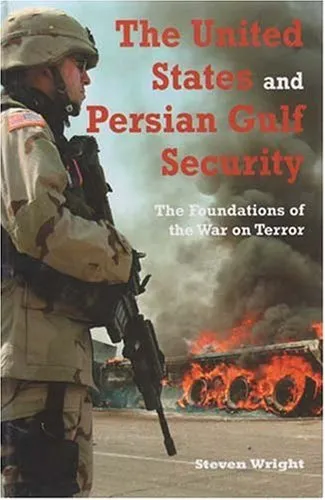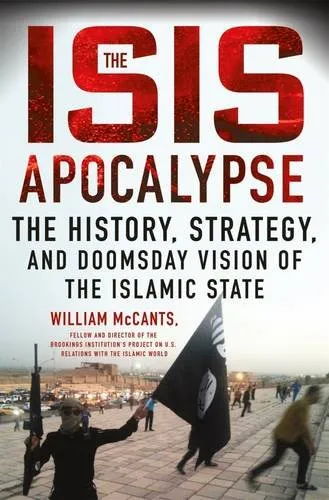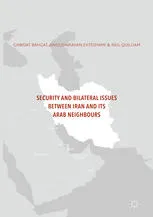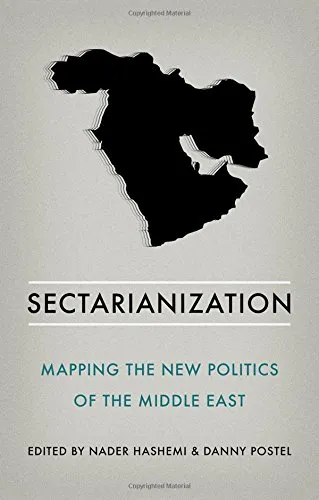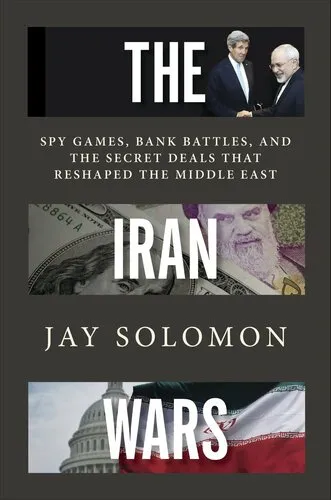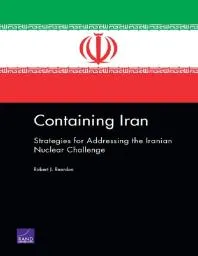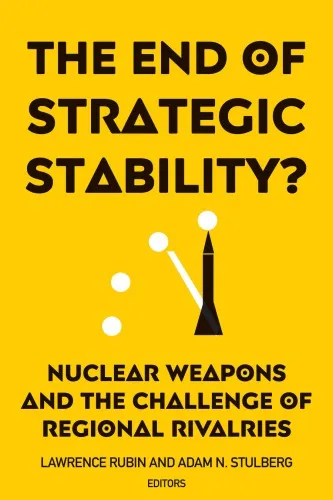The United States and Persian Gulf Security: The Foundations of the War on Terror
4.0
بر اساس نظر کاربران

شما میتونید سوالاتتون در باره کتاب رو از هوش مصنوعیش بعد از ورود بپرسید
هر دانلود یا پرسش از هوش مصنوعی 2 امتیاز لازم دارد، برای بدست آوردن امتیاز رایگان، به صفحه ی راهنمای امتیازات سر بزنید و یک سری کار ارزشمند انجام بدینکتاب های مرتبط:
معرفی کتاب «The United States and Persian Gulf Security: The Foundations of the War on Terror»
اثر «استیون ام. رایت»، کتاب «The United States and Persian Gulf Security: The Foundations of the War on Terror»، به بررسی عمیق نقش ایالات متحده در منطقه خلیج فارس و تحولات امنیتی این منطقه در بستر تاریخی و سیاسی میپردازد. این کتاب یکی از مهمترین منابع برای درک اصول جنگ علیه تروریسم و تأثیر سیاست خارجی آمریکا بر امنیت جهانی است.
خلاصهای جامع از کتاب
این کتاب به تحلیل استراتژیهای آمریکا در خلیج فارس از زمان جنگ سرد تاکنون میپردازد. نویسنده در فصلهای مختلف به موضوعاتی همچون روابط نفتی، امنیت منطقهای، مناقشات سیاسی و نقش کشورهایی مانند ایران، عربستان سعودی، عراق و کویت اشاره میکند. او نشان میدهد چگونه ساختار روابط بینالملل و تأثیر قدرتهای بزرگ بر امنیت خلیج فارس باعث شکلگیری جنگ علیه تروریسم شد.
استیون ام. رایت با استفاده از تحلیلهای تاریخی و سیاسی، نقش رویدادهایی مانند انقلاب اسلامی ایران و جنگ خلیج فارس در تغییر استراتژیهای آمریکا را بررسی میکند. او همچنین به اهمیت شبکههای تروریستی جهانی و کاربرد ابزارهای مدرن سیاسی در تعریف امنیت منطقهای و جهانی میپردازد.
نکات کلیدی کتاب
- نقش آمریکا در جهتدهی ساختار امنیتی خلیج فارس
- تأثیر انقلاب اسلامی ایران بر سیاست خارجی آمریکا
- تحلیل اقتصاد نفت و ارتباط آن با امنیت منطقه
- شکلگیری جنگ علیه تروریسم پس از حملات ۱۱ سپتامبر
- ارزیابی شبکههای تروریستی و چالشهای منطقهای
جملات معروف از کتاب
«امنیت خلیج فارس همواره به صورت ناگسستنی با اقتصاد جهانی و نقش قدرتهای بزرگ در ارتباط بوده است.»
«انقلاب ایران نه تنها سیاست داخلی این کشور بلکه امنیت منطقهای و جهانی را تحولی اساسی بخشید.»
«حمله به عراق در سال ۲۰۰۳ بیش از هر چیزی، ساختار شکننده منطقه را به نمایش گذاشت.»
چرا این کتاب اهمیت دارد؟
کتاب «The United States and Persian Gulf Security» به عنوان یکی از منابع برجسته در مطالعات امنیتی و روابط بینالملل، اهمیت بالایی دارد. این اثر با ارائه تحلیلهای دقیق و مستند، به فهم جامع سیاستهای آمریکا در منطقه خلیج فارس کمک میکند. همچنین، این کتاب اطلاعاتی ارزشمند درباره ریشههای امنیت جهانی و تعامل میان نفت، سیاست و تروریسم ارائه میدهد.
برای پژوهشگرانی که به دنبال مطالعه عمیق در حوزه روابط بینالملل، اقتصاد سیاسی و امنیت خاورمیانه هستند، این کتاب یک راهنمای ضروری محسوب میشود. علاوه بر این، فهم اصول جنگ علیه تروریسم و سیاستهای پساجنگ سرد در این اثر به طور کامل بررسی شده است.
Introduction
Welcome to The United States and Persian Gulf Security: The Foundations of the War on Terror, a comprehensive exploration of the intricate geopolitical dynamics that have shaped one of the most volatile regions in the world—the Persian Gulf. This book delves deep into the historical, political, and economic underpinnings of U.S. foreign policy in the region, revealing how decades of decisions laid the groundwork for the War on Terror. Through thorough analysis and detailed research, this work provides a clear understanding of how various events, from the Cold War to the modern day, have intersected to create a complex web of alliances, conflicts, and strategies.
The Persian Gulf remains one of the most strategically significant regions due to its abundant energy resources and critical geopolitical location. The United States has played a central role in shaping regional security since the mid-20th century, and the policies it has pursued have had far-reaching implications, including the global response to terrorism. By tracing the evolution of these policies, this book helps readers grasp the multifaceted narratives behind the War on Terror and the enduring challenges the U.S. faces in maintaining stability and security in the Gulf region.
Detailed Summary of the Book
This book is structured to provide readers with an in-depth analysis of the various critical junctures that shaped U.S. involvement in the Persian Gulf. It begins by examining the Cold War era, during which the U.S. sought to counter Soviet influence in the region. Key events such as the Iranian Revolution, the Iran-Iraq War, and the Gulf War are analyzed to understand how the U.S. adapted its strategies to preserve access to oil and protect its allies.
Following the Cold War, the book explores the profound impact of 9/11 and the emergence of Al-Qaeda as a global terrorist organization. I analyze the polarization of American foreign policy, focusing on the U.S. invasions of Afghanistan and Iraq. Central to the discussion is the notion of security—how the U.S. conceptualized its role as a guarantor of stability and the profound consequences of those choices for the region and the global community.
The book also scrutinizes policy missteps and unintended consequences—such as the rise of sectarian divides and the destabilization of key states. Finally, it draws connections between these historical patterns and the ongoing challenges of combating terrorism, managing regional rivalries, and promoting peace in an increasingly complex geopolitical landscape.
Key Takeaways
- The Persian Gulf has been central to U.S. foreign policy due to its vast energy resources and strategic importance.
- The legacy of Cold War policies still affects modern conflicts and alliances in the region.
- The War on Terror is a culmination of decades-long geopolitical tensions and unresolved conflicts in the Persian Gulf.
- U.S. policies in the Gulf have often had unintended consequences, such as fostering state fragility and furthering terrorism.
- Understanding the historical context is essential to forming future strategies for stability in the region.
Famous Quotes from the Book
"The Persian Gulf represents the intersection of energy dependency, ideological divides, and the ever-present strategic ambitions of global powers."
"The War on Terror did not emerge in a vacuum—it is the product of policies forged in the crucible of Cold War rivalries and regional instabilities."
"To understand the future of Persian Gulf security, one must first reckon with the past—where alliances, wars, and ideologies collided to shape today's realities."
Why This Book Matters
The United States and Persian Gulf Security is a critical resource for anyone seeking to understand the historical underpinnings of one of the most pressing issues of our time—the War on Terror. By meticulously analyzing the interplay of U.S. policies, regional dynamics, and global challenges, the book provides a nuanced perspective that is often missing from contemporary debates.
For policymakers, academics, and students of international relations, this book offers valuable insights into the importance of contextualizing decisions within their broader historical framework. It challenges simplistic narratives and shines a light on the consequences of foreign policy choices, empowering readers to approach current challenges with greater awareness and depth.
In a world where terrorism, energy security, and regional stability continue to dominate the global agenda, understanding the Persian Gulf's history and its relationship with the United States is essential. This book equips readers with the knowledge needed to engage meaningfully with these critical issues and to envision pathways toward a more stable and secure future.
دانلود رایگان مستقیم
شما میتونید سوالاتتون در باره کتاب رو از هوش مصنوعیش بعد از ورود بپرسید
دسترسی به کتابها از طریق پلتفرمهای قانونی و کتابخانههای عمومی نه تنها از حقوق نویسندگان و ناشران حمایت میکند، بلکه به پایداری فرهنگ کتابخوانی نیز کمک میرساند. پیش از دانلود، لحظهای به بررسی این گزینهها فکر کنید.
این کتاب رو در پلتفرم های دیگه ببینید
WorldCat به شما کمک میکنه تا کتاب ها رو در کتابخانه های سراسر دنیا پیدا کنید
امتیازها، نظرات تخصصی و صحبت ها درباره کتاب را در Goodreads ببینید
کتابهای کمیاب یا دست دوم را در AbeBooks پیدا کنید و بخرید
1390
بازدید4.0
امتیاز0
نظر98%
رضایتنظرات:
4.0
بر اساس 0 نظر کاربران
Questions & Answers
Ask questions about this book or help others by answering
No questions yet. Be the first to ask!
